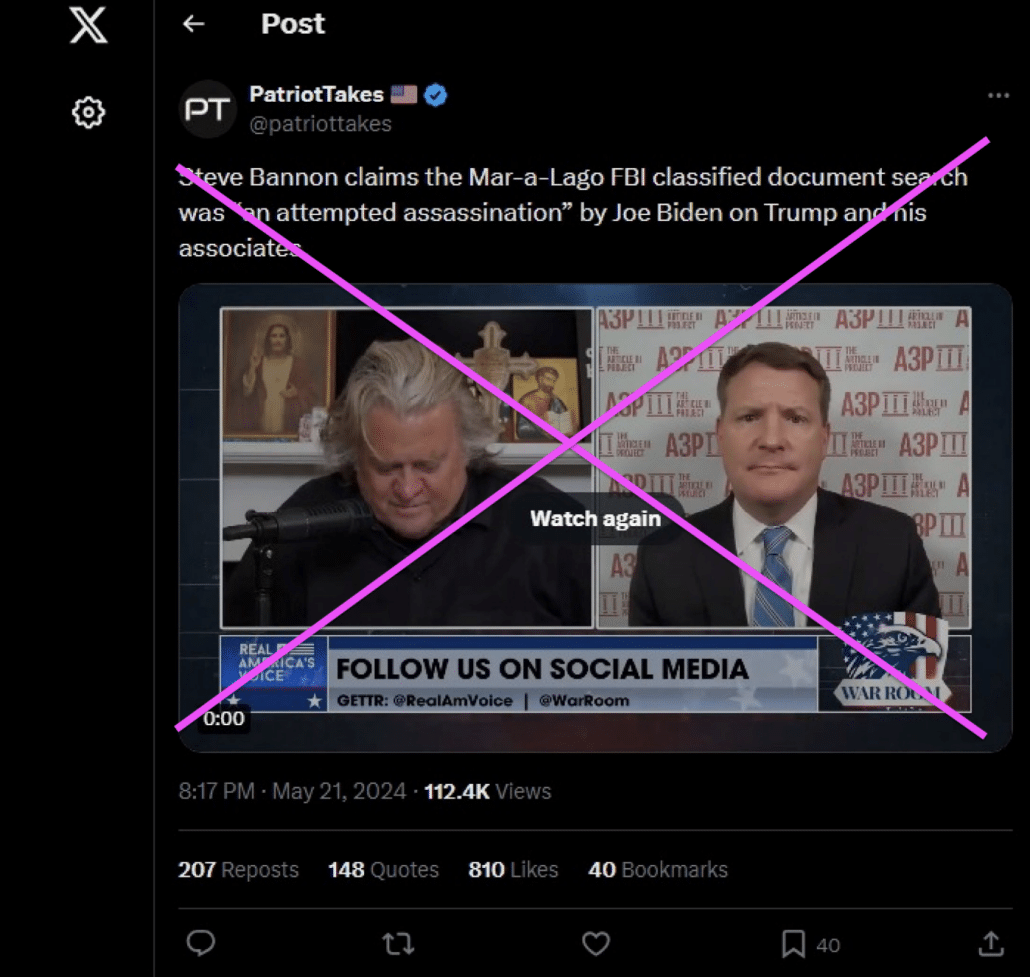Both Steve Bannon and Stephen Miller have made legal arguments in recent days, claiming not just the right, but the need, to sow right wing violence before the election.
In Bannon’s unsuccessful emergency motion to delay reporting to prison filed June 11, he argued that he needs to stay out of prison so he can “speak out on important issues” in the four months leading up to the Presidential election.
The government seeks to imprison Mr. Bannon for the four-month period leading up to the November election, when millions of Americans look to him for information on important campaign issues. This would also effectively bar Mr. Bannon from serving as a meaningful advisor in the ongoing national campaign.
[snip]
There is also a strong public interest in Mr. Bannon remaining free during the run-up to the 2024 presidential election. The government seeks to imprison him for the four-month period immediately preceding the November election—giving an appearance that the government is trying to prevent Mr. Bannon from fully assisting with the campaign and speaking out on important issues, and also ensuring the government exacts its pound of flesh before the possible end of the Biden Administration.
No one can dispute that Mr. Bannon remains a significant figure. He is a top advisor to the President Trump campaign, and millions of Americans look to him for information on matters important to the ongoing presidential campaign. Yet from prison, Mr. Bannon’s ability to participate in the campaign and comment on important matters of policy would be drastically curtailed, if not eliminated. There is no reason to force that outcome in a case that presents substantial legal issues.
After two Democratic appointees denied that bid today (with former Mitch McConnell protégé Justin Walker dissenting), Bannon immediately filed an emergency appeal to SCOTUS. That, too, included Bannon’s wail about the election.
There is also no denying the fact that the government seeks to imprison Mr. Bannon for the four-month period immediately preceding the November presidential election.
Consider what “comment[s] on important matters of policy” Bannon has been making of late: At the Turning Point Conference this week, Bannon incited a room of people by declaring “Victory or Death,” while promising to arrest much of the current DOJ.
Meanwhile “Discount Goebbels” Miller’s outfit asked to submit an amicus brief supporting Trump’s challenge to Jack Smith’s request to prevent Trump from falsely claiming the FBI came to assassinate him in the Mar-a-Lago search.
Miller’s proposed amicus similarly treats the type of speech that Smith wants to limit — false claims that have already inspired a violent attack on the FBI (even before the MAGAt threats against an FBI agent involved in the Hunter Biden case last week) — as speech central to Trump’s campaign for President.
The Supreme Court has accordingly treated political speech—discussion on the topics of government and civil life—as a foundational area of protection. This principle, above all else, is the “fixed star in our constitutional constellation[:] that no official, high or petty, can prescribe what shall be orthodox in politics[ or] nationalism . . . or force citizens to confess by word or act their faith therein.” W. Va. State Bd. of Educ. v. Barnette, 319 U.S. 624, 642 (1943) (Jackson, J.). Therefore, “[d]iscussion of public issues and debate on the qualifications of candidates” are considered “integral” to the functioning of our way of government and are afforded the “broadest protection.” Buckley, 424 U.S. at 14.
Because “uninhibited, robust, and wide-open” debate enables “the citizenry to make informed choices among candidates for office,” “the constitutional guarantee has its fullest and most urgent application precisely to the conduct of campaigns for political office.” Id. at 14-15 (citations omitted). Within this core protection for political discourse, the candidates’ own speech—undoubtedly the purest source of information for the voter about that candidate—must take even further primacy. Cf. Eu v. S.F. Cnty. Democratic Cent. Comm., 489 U.S. 214, 222-24 (1989) (explaining that political speech by political parties is especially favored). This must be especially true when, as here, the candidate engages in a “pure form of expression involving free speech alone rather than expression mixed with particular conduct.” Buckley, 424 U.S. at 17 (cleaned up) (contrasting picketing and parading with newspaper comments or telegrams). These principles layer together to strongly shield candidates for national office from restrictions on their speech.
Miller calls the false attack on the FBI peaceful political discourse.
Importantly, Miller dodges an argument Smith made — that Trump intended people like Bannon to repeat his false claims. In disclaiming any intent to incite imminent action, Miller ignores the exhibit showing Bannon parroting Trump’s false claim.
It cannot be said that by merely criticizing—or, even as some may argue, mischaracterizing—the government’s actions and intentions in executing a search warrant at his residence, President Trump is advocating for violence or lawlessness, let alone inciting imminent action. The government’s own exhibits prove the point. See generally ECF Nos. 592-1, 592-2. 592-3, 592-5.
But that was the point — Jack Smith argued — of including an exhibit showing Bannon doing just that.
Predictably and as he certainly intended, others have amplified Trump’s misleading statements, falsely characterizing the inclusion of the entirely standard use-of-force policy as an effort to “assassinate” Trump. See Exhibit 4.
In courts up and down the East Coast, the two Stevens are making the same argument: That Trump and his team must be permitted to make false, incendiary attacks on rule of law as part of an electoral campaign.
We shall see soon whether SCOTUS chooses to protect those same false claims on rule of law.
Update: Judge Cannon denied Miller’s motion to file an amicus.

